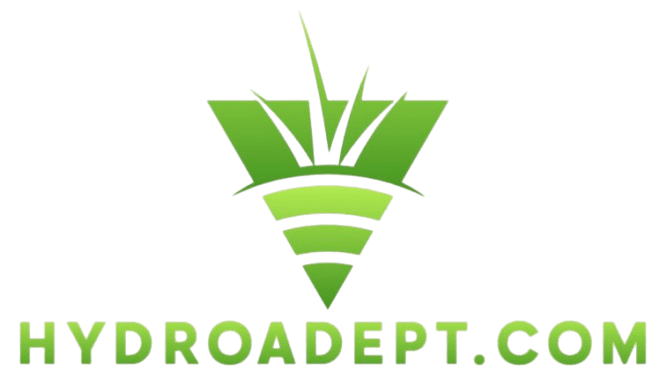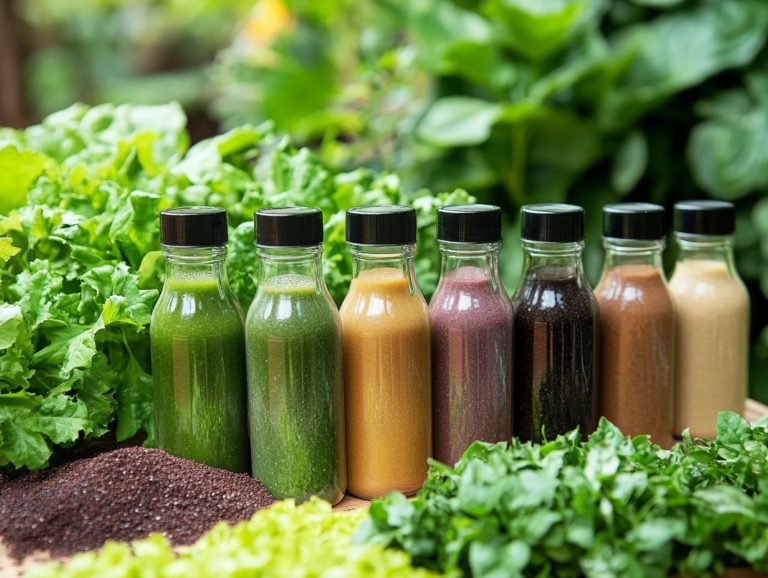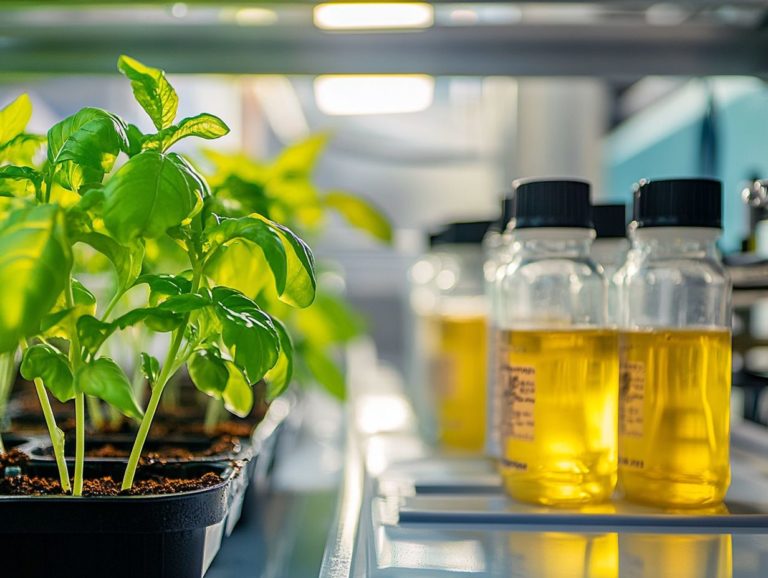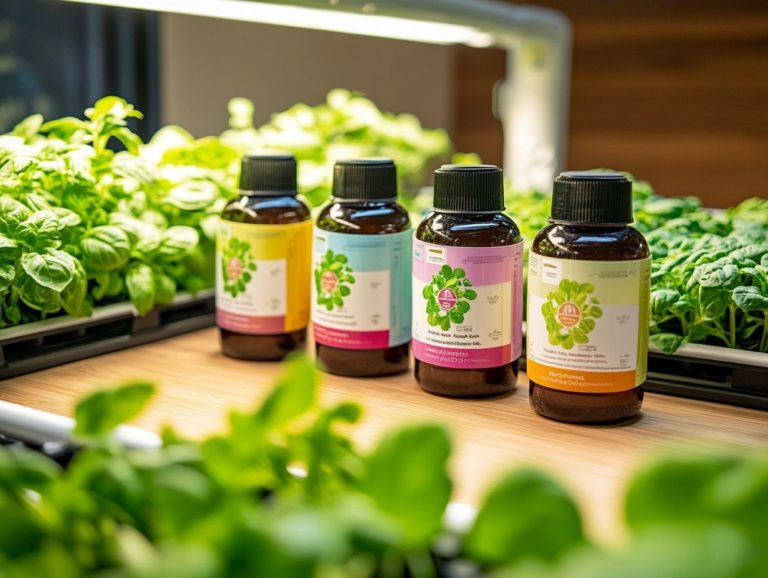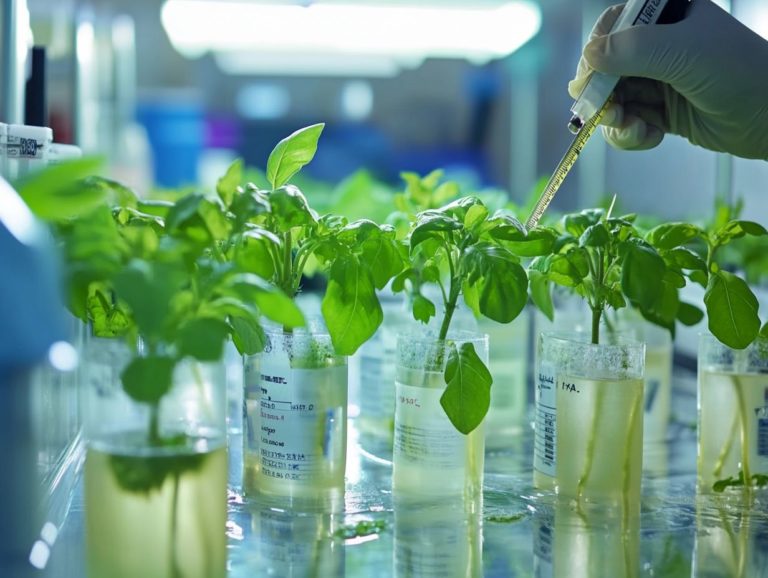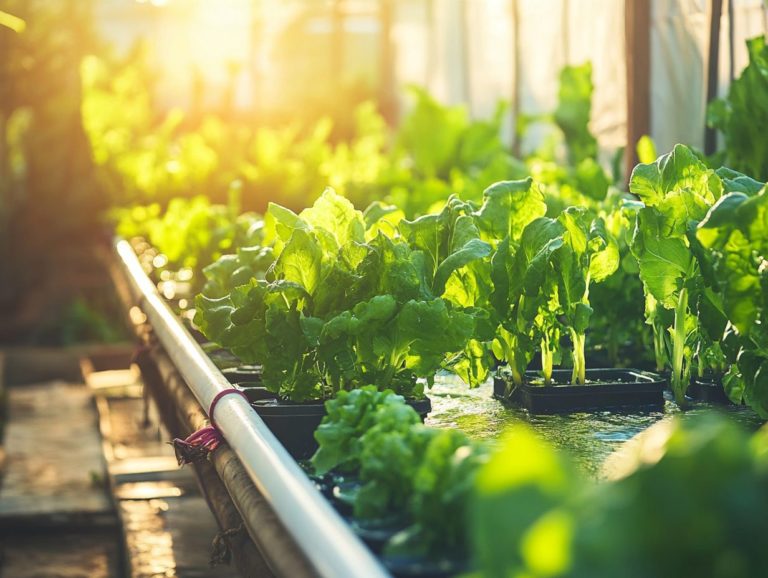The Importance of Zinc in Hydroponics
Zinc is an essential micronutrient in hydroponics, profoundly influencing plant health and growth regulation, and agricultural productivity.
Let s explore the crucial role of zinc in nutrient uptake. You’ll see how it boosts growth and protects against diseases.
This article showcases zinc’s remarkable capacity to enhance growth, yield, vegetable quality, and resilience against diseases and pests.
You will discover how to recognize the signs of zinc deficiency, including signs such as leaf chlorosis, which are vital indicators for addressing deficiencies. Explore effective supplementation methods and implement best practices to maintain optimal zinc levels in your hydroponic systems.
Whether you’re just starting out or have years of experience under your belt, grasping the vital role of zinc can significantly enhance your gardening success.
Contents
- Key Takeaways:
- Why Zinc Matters in Hydroponics
- Unlocking the Benefits of Zinc for Your Hydroponics
- Signs of Zinc Deficiency in Hydroponic Plants
- How to Add Zinc to Hydroponic Systems
- Best Practices for Maintaining Zinc Levels in Hydroponics
- Frequently Asked Questions
- What is the role of zinc in hydroponics?
- How does zinc deficiency affect hydroponic plants?
- What are some common signs of zinc deficiency in hydroponic plants?
- How can I add zinc to my hydroponic system?
- Can I overdo zinc in my hydroponic system?
- Are there any natural sources of zinc for hydroponic plants?
Key Takeaways:
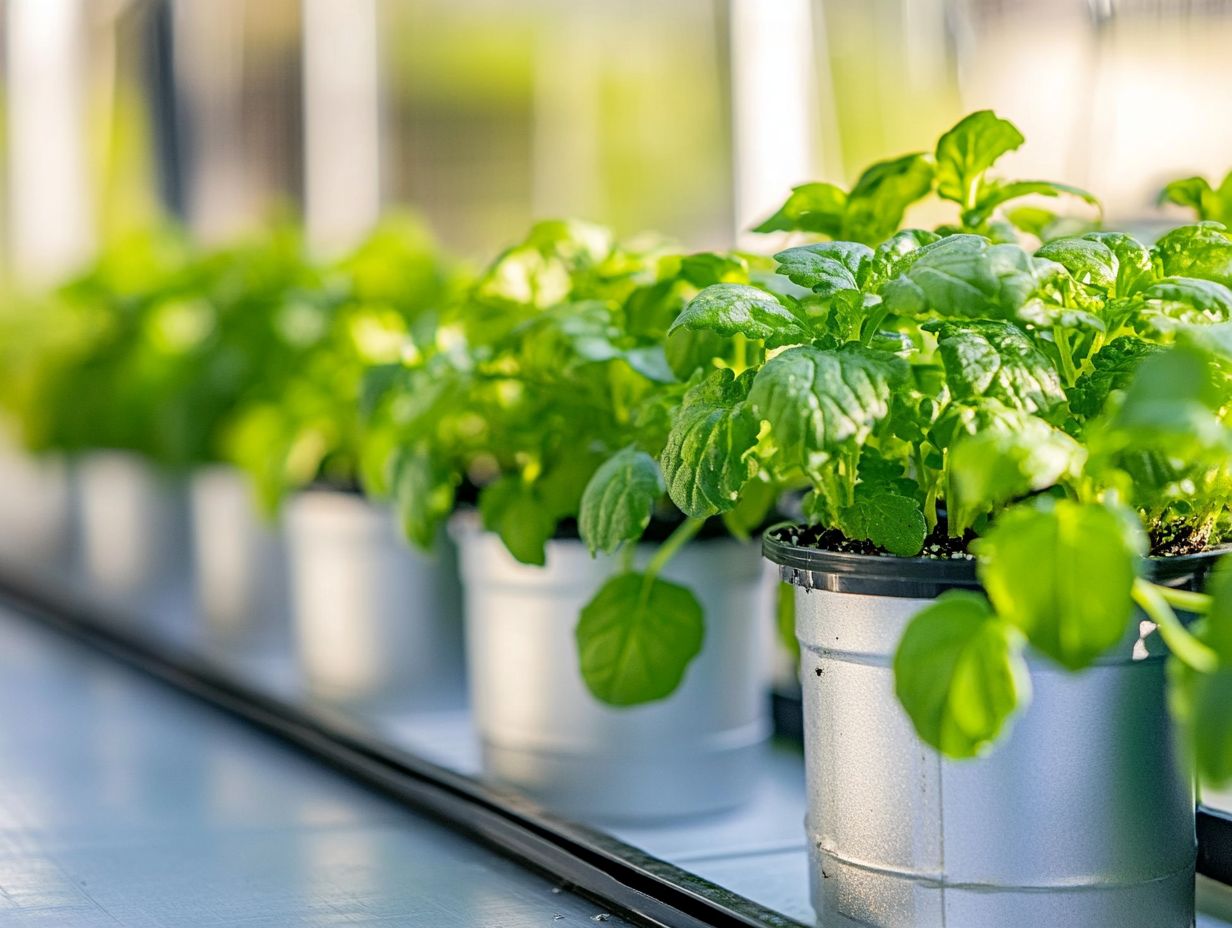
- Zinc plays a crucial role in the nutrient uptake of plants in hydroponic systems, ensuring healthy growth and yield.
- Including zinc in hydroponic setups can lead to increased plant resistance to diseases and pests, resulting in overall healthier plants.
- Regularly monitoring and addressing zinc deficiencies in hydroponic plants is necessary for optimal growth and avoiding potential crop failures.
Why Zinc Matters in Hydroponics
Zinc plays an essential role in hydroponics, serving as a critical micronutrient that profoundly influences your plants’ health and development. In soilless systems, where every nutrient solution and organic fertilizer concentration is meticulously monitored, the significance of zinc becomes crystal clear in various physiological processes such as chlorophyll production, protein synthesis, and chloroplast function.
By optimizing zinc levels, you can enhance photosynthesis and nutrient uptake, improve root growth, and regulate metabolic functions. Ultimately, this leads to higher yields in your hydroponic crops, including basil (Ocimum basilicum). Understanding zinc’s impact on nutrient uptake is vital for effective crop management, ensuring that your plants thrive even in nutrient-deficient environments.
Understanding Nutrient Uptake in Plants
Nutrient uptake in plants unfolds as a complex yet fascinating process, requiring the absorption of essential elements, including micronutrients like zinc, through the roots into the nutrient solution. This journey is vital for maintaining plant health and ensuring optimal growth within hydroponic systems.
The mechanisms behind micronutrient absorption are influenced by various factors, such as the concentration of the nutrient solution and the specific ratios of nutrients present. For instance, while higher concentrations of zinc can enhance uptake efficiency, it s imperative to balance this with other nutrient levels to avoid toxicity or deficiencies. Environmental stresses, like drought or salinity, can significantly hinder a plant’s ability to assimilate zinc.
Grasping these interactions is crucial for optimizing your nutrient management strategies, ultimately boosting overall plant development and resilience.
Unlocking the Benefits of Zinc for Your Hydroponics
Zinc provides a wealth of benefits when incorporated into hydroponic systems. It significantly boosts plant growth and development as well as overall yield. As a vital micronutrient, it is integral to various physiological processes that elevate crop management strategies and enhance plant health.
Improved Growth and Yield

Zinc in your nutrient solutions can significantly enhance plant growth and yield in hydroponic systems. This essential micronutrient is vital for chlorophyll production, which is crucial for photosynthesis and energy conversion in plants.
Zinc is crucial for activating various enzymes that are integral to body processes, including carbohydrate metabolism and protein synthesis. By facilitating these biochemical reactions, zinc gives your plants the power to make the most of the nutrients in their hydroponic environments, and understanding the role of magnesium in hydroponics can further enhance this process.
Studies on hydroponically grown tomatoes show that maintaining adequate zinc levels can lead to a remarkable 20% increase in fruit yield compared to crops lacking zinc. Lettuce grown with the right zinc levels demonstrated improved growth rates and enhanced leaf quality, underscoring the nutrient’s significant impact on overall plant health and productivity.
Resistance to Disease and Pests
Let s explore why zinc is a game-changer against diseases and pests. Zinc significantly enhances your plants’ resistance to diseases and pests, positioning it as a vital micronutrient in hydroponic farming. Its role in body functions and stress tolerance is key to maintaining overall plant health, enabling them to better withstand external threats.
Zinc helps enzymes work better and boosts chlorophyll production. This is crucial for strong plant growth and resilience. This micronutrient activates various defense mechanisms, boosting the production of phytoalexins natural substances that help plants fight off diseases and fortifying cell walls, which act as barriers against pathogens.
With proper zinc management, you can effectively combat specific diseases like powdery mildew and deter pests such as aphids. In the realm of hydroponics, ensuring adequate zinc levels not only helps prevent nutrient deficiencies but also enhances overall plant vigor, creating a sustainable environment for optimal growth.
Signs of Zinc Deficiency in Hydroponic Plants
Identifying the signs of zinc deficiency in your hydroponic plants is essential for ensuring their optimal health and productivity. You should be on the lookout for common symptoms such as leaf chlorosis, stunted growth, and poor root development.
These may signal that your nutrient solution is lacking this crucial micronutrient. Addressing these issues promptly can make all the difference in your plants’ vitality.
Identifying and Addressing Deficiencies
To tackle zinc deficiency, pay close attention to your plants. Look for signs of yellow leaves and slow growth; these serve as vital indicators that zinc levels may be lacking, prompting the need for timely intervention.
To effectively pinpoint these deficiencies, utilize a combination of visual inspections and soil tests. Watch your plants for signs such as interveinal chlorosis and malformed leaves these provide immediate clues about their health. Meanwhile, soil tests will give you a detailed analysis of nutrient levels, guiding your next steps.
Adjusting your nutrient solution to incorporate zinc is crucial. Consider strategies like foliar treatment for quick nutrient absorption for a quick boost to affected plants. By maintaining a balanced nutrient ratio, you ll not only tackle the immediate zinc deficiency but also enhance overall plant health, ultimately optimizing growth and yield.
How to Add Zinc to Hydroponic Systems
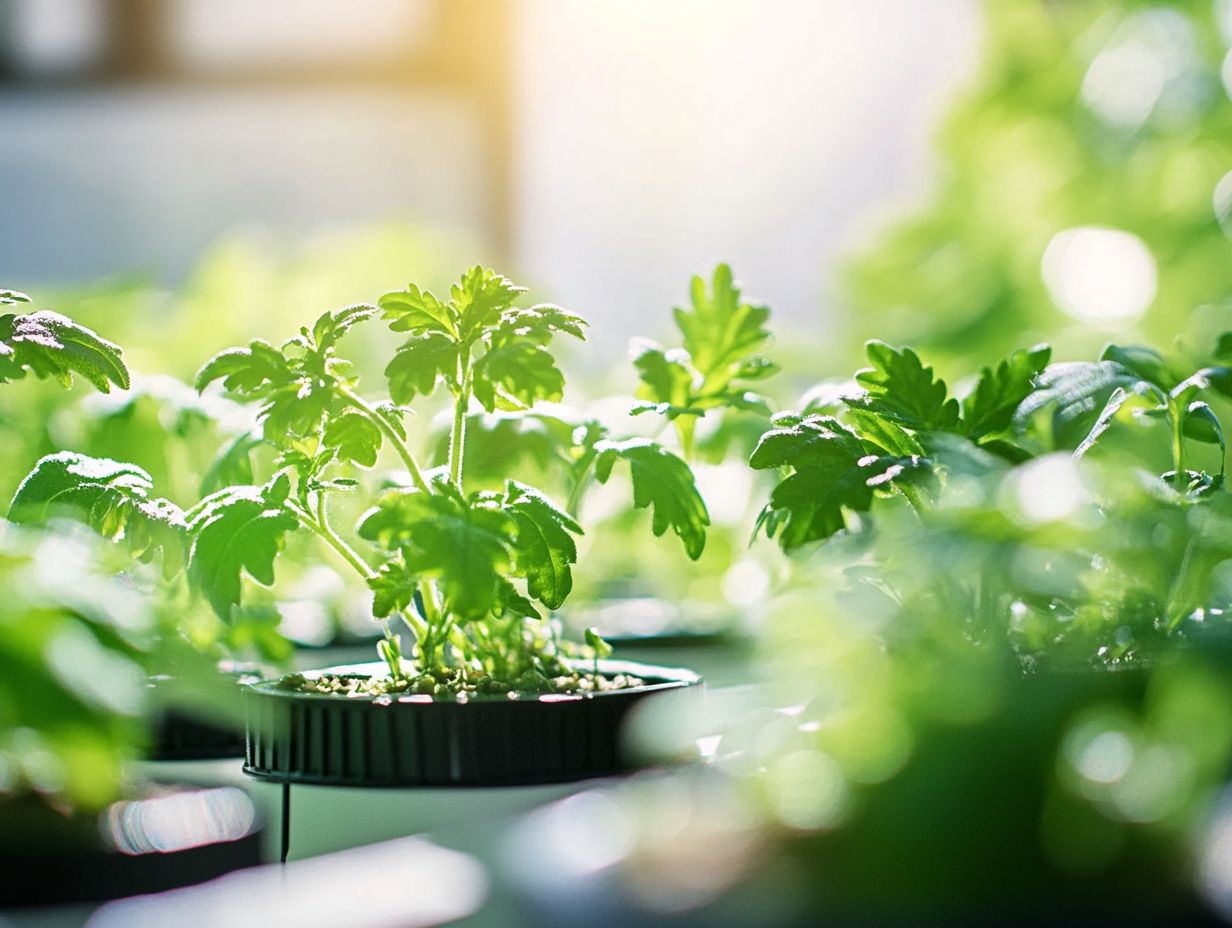
Integrating zinc into your hydroponic systems can be accomplished through a range of effective supplementation methods, ensuring your plants receive this essential micronutrient for optimal growth.
Techniques like incorporating zinc into the nutrient solution or utilizing foliar treatments can adeptly address any deficiencies and significantly enhance plant health.
Methods of Zinc Supplementation
You can explore various methods of zinc supplementation in hydroponics to maintain adequate levels of this essential nutrient. Options include adding zinc directly to your nutrient solution or using foliar treatments for more targeted absorption. Zinc directly impacts metabolic functions and stress tolerance.
Each technique comes with its own set of advantages and drawbacks. Liquid fertilizers provide quicker absorption. This is crucial during specific growth phases. Solid forms of zinc are easier to apply. However, they may lead to uneven nutrient distribution within your system.
The key is to understand the optimal concentration levels for each plant species. Too high a dose can cause toxicity and stifle growth. Timing your application is also vital, as the initial signs of zinc deficiency tend to emerge during critical growth stages.
Keeping a close eye on your plants and adjusting accordingly will be essential for achieving optimal results.
Best Practices for Maintaining Zinc Levels in Hydroponics
Maintaining optimal zinc levels in your hydroponic systems is essential for the ongoing health and productivity of your plants. To achieve this, it s important to regularly monitor your nutrient solutions and grasp the intricate relationships between essential nutrients.
This approach significantly promotes robust plant growth and vitality.
Tips for Optimal Zinc Absorption
To ensure optimal zinc absorption in your hydroponic systems, you can implement several strategies to enhance nutrient availability and uptake. Consider utilizing organic acids in your nutrient solution; they improve zinc bioavailability and promote root growth.
Integrating chelated forms of zinc can significantly boost its solubility and accessibility to your plant roots, allowing for enhanced uptake. It’s also essential to monitor and adjust pH levels within your nutrient solution; fluctuations can affect zinc availability and ultimately impact plant growth. For a deeper understanding, explore the role of micronutrients in hydroponics.
Keeping your nutrient concentrations just right is key to thriving plants! An excess or deficiency of other minerals may interfere with zinc absorption. Understanding these nutrient interactions is vital, especially since elements like phosphorus and iron can either aid or impede zinc uptake.
This underscores the importance of a balanced nutrient approach for thriving crops.
Frequently Asked Questions
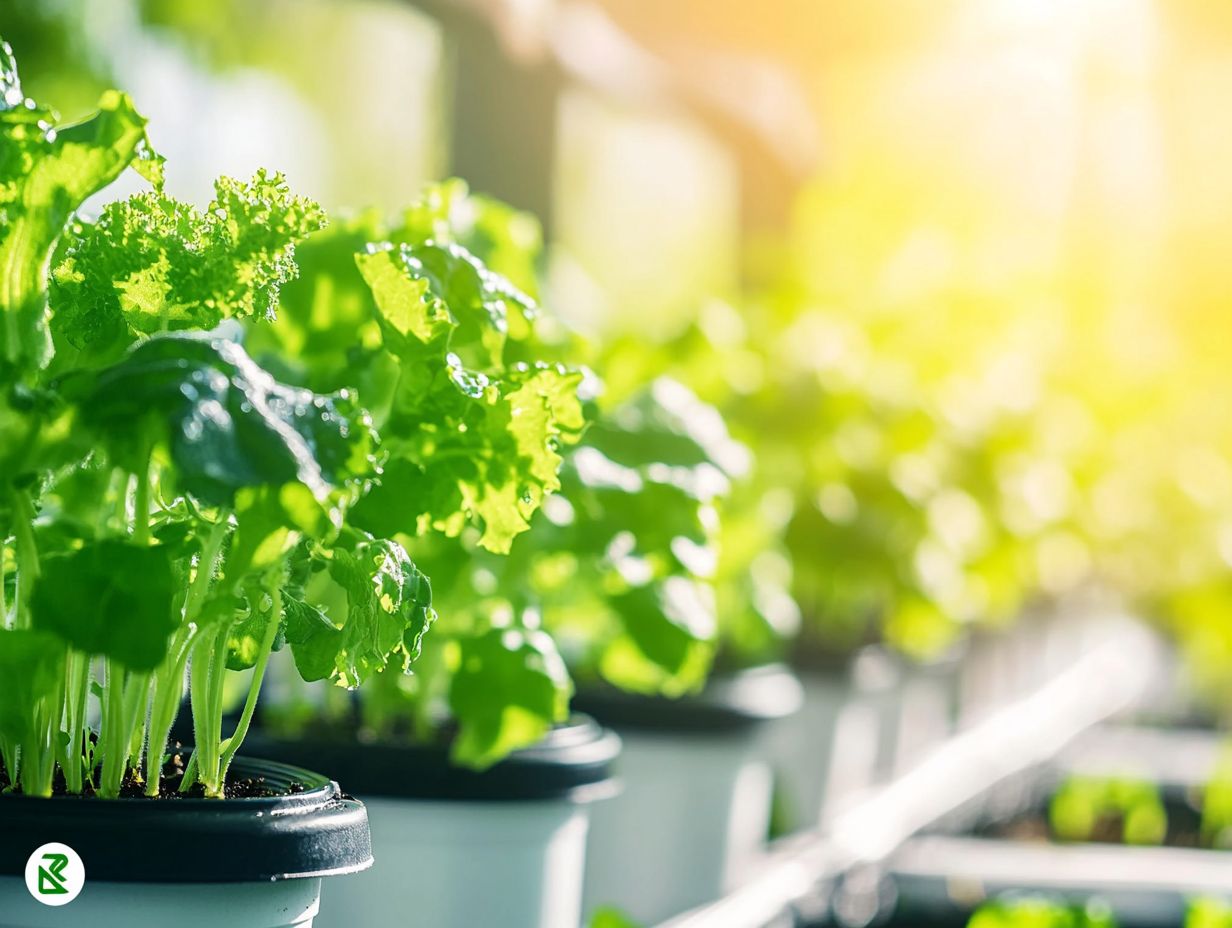
What is the role of zinc in hydroponics?
Zinc is an essential nutrient for plants, playing a crucial role in various physiological processes such as enzyme activity, photosynthesis, and hormone production. In hydroponics, zinc helps promote healthy growth and development of plants.
How does zinc deficiency affect hydroponic plants?
Without sufficient zinc, plants may exhibit stunted growth, yellowing of leaves, and reduced fruit or flower production. Zinc deficiency can also make plants more susceptible to disease and pests.
What are some common signs of zinc deficiency in hydroponic plants?
One of the tell-tale signs of zinc deficiency in hydroponic plants is the yellowing of new leaves while older leaves remain green. Other symptoms include distorted or small leaves, reduced root growth, and delayed maturity.
How can I add zinc to my hydroponic system?
One way to add zinc to a hydroponic system is through the use of nutrient solutions specifically formulated for hydroponics, which contain all the essential micronutrients, including zinc. Another option is to use foliar sprays or add zinc sulfate to the nutrient solution.
Can I overdo zinc in my hydroponic system?
Yes, too much zinc can be harmful to plants. Excessive levels of zinc can lead to toxicity, causing root damage, reduced growth, and even death of plants. It is important to monitor and maintain proper levels of zinc in your hydroponic system.
Are there any natural sources of zinc for hydroponic plants?
Yes, there are natural sources of zinc that can help your hydroponic plants thrive! Natural sources include organic compost, worm castings, and animal manure.
Worm castings are nutrient-rich soil created from the excrement of worms. Be sure to test the zinc levels before adding them to your system for the best results!
